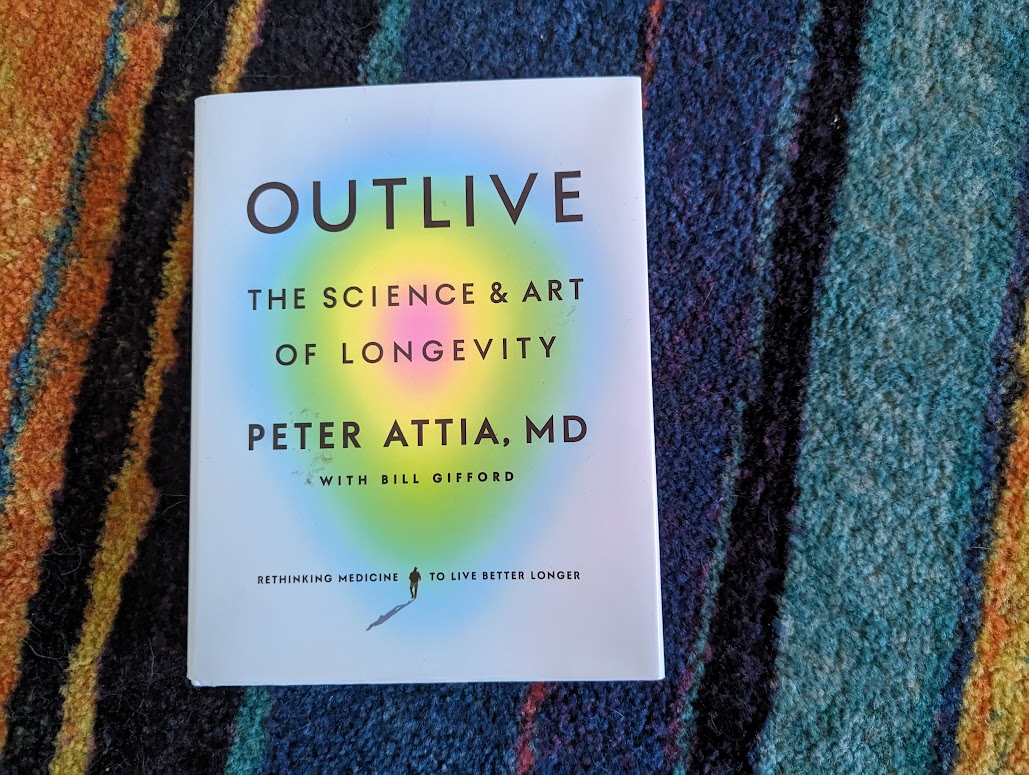I think most everyone knows medicine isn’t fully awesome. The system for sure isn’t, but if you’ve ever fought for a diagnosis, you know there’s a limit to how we train western medicine practitioners. Lots of us rely on alternatives, like ancient Asian medicine and others to supplement western medicine.
Attia’s perspective is actually even one step beyond treatment, and he calls it Medicine 3.0 = the science of healthy longevity. It is not enough to just fix you when you’re sick to keep you going, we all need to work under the assumption we can live to be 120 and make an effort to maintain quality of life up to that point. In fact, he says a lot of those long lived people don’t live in a chronic state of disease – they just die fast. Sounds good, sign me up! Here are my notes.
The majority of the book is riveting studies that support his case, I’m not taking notes on that. Instead, these are the note that *I* find helpful in terms of wanting to follow Medicine 3.0.
The Four Horsemen that are the main problem:
- Heart disease
- Cancer
- Neurodegeneration
- Type 2 Diabetes
What do we do about it?
- Exercise
- Be able to complete the centegenarian decathlon
- Hike 1.5 miles on a hilly trail
- Get off the floor under own power, using max of one arm for support
- Pick up a child from the floor
- Carry two five-pound bags of groceries five blocks
- Lift a 20-pound suitcase into the overhead compartment of a plane
- Balance on one leg for thirty seconds, eyes open (bonus for closed, fifteen seconds)
- Have sex
- Climb four flights of stairs in three minutes
- Open a jar
- Do thirty consecutive jump-rope skips
- BONUS LISTS FOR HIGH FITNESS(this is his list, make your own):
- Swim half a mile in twenty minutes
- Wlak with a 30-pound dumbell in each hand for one minute
- Draw back and fire a fifty-pound compound bow
- Do five pull ups
- Climb ninety steps in two minutes
- Dead hang for one minute
- Drive a race care 5-8 percent of the pace I can do today
- Hike with a twenty-pound pack for an hour
- Carry my own luggage
- Walk up a steep hill
- Zone 2 aerobic exercises for a while (listen to podcasts)
- Helps get rid of glucose safely
- Push that VO2 max.
- 3-8 minutes a notch down from HIIT traiining
- Only after 6 months of steady Zone 2 work
- Strength training
- Grip strength – huge body of knowledge = grip strength in midlife and beyond decreases all overall mortality risk
- Concentric and eccentric loading (rucking down hills is great for this)
- Pulling motions
- Hip hinging motions
- Stability
- Make really good squats with heels down
- Feldenkreis type stuff
- Be able to complete the centegenarian decathlon
- Nutritional biochemistry – don’t over think this, though. Exercise if you do. That’s the best.
- Dietary restriction (figuring out what works for your body, then figure out what diet you can sustain based on what does) is the hands down winner
- Alcohol – if you’re doing it in moderation and mindfulness to help emotional stress (see below), go for it, but it’s a net-negative on longevity
- Carbohydrates – try a Continuous Glucose monitor to see how foods and such affect you. Keeping glucose low and stable is key.
- The first month on a CGM is dominated by insights
- Thereafter, it is dominated by behavior modification
- Protein – needs vary, but current data suggests 1 g per pound of body weight per day. Plant and powdered protein is hard to digest. Protein is essential for muscle mass and reaching goals. Don’t neglect it. Do not compromise it!
- Fat – Vegetable oils, and if you’re not eating a lot of fish, take EPA and DHA supplements
- Fasting – it’s really good for hard cases but it results in muscle loss so not a fan of a ton of fasting.
- Sleep
- High glucose in the morning = stress if you didn’t eat late at night
- Poor sleep = eat badly
- Deep sleep = fights degenerative disease
- Blue light blockers
- Don’t bring screens into bedroom, abstain from electronics for two hours prior
- Don’t drink
- Coffee isn’t helping you here
- Don’t eat at least 3 hours before bedtime; and it’s good to go to bed a little hungry
- Don’t check work or social media and hour before bed
- Sauna or hot tub is great
- Cool sleeping environment
- Darken room
- Give yourself at least nine hours before you need to wake up, no time, the rest of this is pointless
- Fix your wake up time and don’t change it on weekends
- Emotional health
- Dialectical behavior therapy = breaking the chain of negative stimulus -> negative emotion -> negative thought – > negative action
- Mindfulness
- Exogenous molecules (stuff not under your control)

